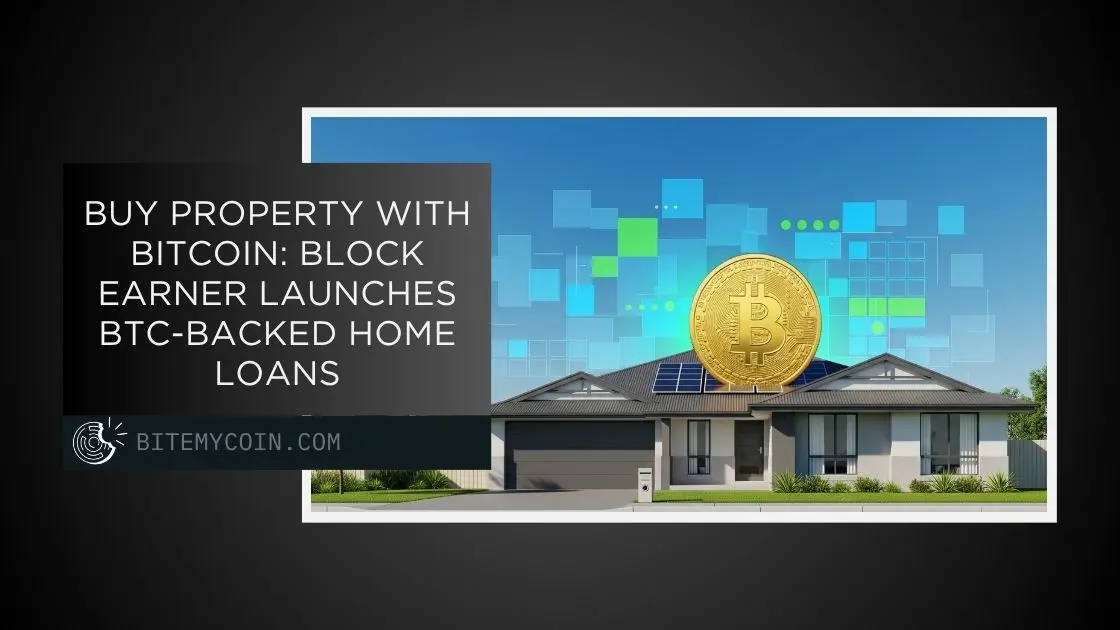Australians Can Now Use Their Bitcoin To Finance Real Estate Purchases

Sydney-based fintech Block Earner, which offers crypto yield and payment products, has introduced a first-of-its-kind Bitcoin-backed loan that will allow Australians to finance a property in the alpha cryptocurrency, without having to sell it.
The offering aims to address a longstanding challenge for crypto holders: maintaining exposure to digital assets while using them to access financial opportunities in the real world.
Block Earner allows Australian Crypto Holders to Finance Up to 50% of Their Housing Loan In Bitcoin
The revolutionary lending product offers up to 50% of the real estate’s value as a deposit loan secured against the borrower’s Bitcoin. Block Earner has partnered with digital asset security platform Fireblocks to securely custody the customers’ collateralized BTC holdings.
The fintech’s Bitcoin loan follows a straightforward model, where the borrower transfers their BTC to the company, which is then used to finance up to half of the property’s value as a deposit, enabling them to secure the remaining amount from a traditional lender.
The loan is interest-only for up to four years. The company claims that the structure allows customers to maintain BTC exposure while sidestepping the liquidation and tax implications of selling the asset to raise capital. Borrowers also benefit from flexible repayment options, including cash or cryptocurrency, and can close the loan before the end of the tenure without penalties.
Block Earner has also considered the inherent volatility risks of crypto assets, capping the lending facility’s loan-to-value (LVR) at 60% to ensure that the amount borrowed does not exceed 60% of the value of the Bitcoin promised as collateral.
Speaking to crypto media outlet Decrypt, Charlie Karaboga, CEO of Block Earner, said that the buffer would help protect against price swings while reducing the risk of forced liquidations.
He also mentioned that the loan comes with a monthly repayment component, in line with Australian regulations, and if Bitcoin suffers a significant price drop during the tenure, borrowers are given a 30-day notice to fix the LVR through fiat repayment, collateral repayment, or a BTC top-up. In case the customer is unable to correct their LVR, the lender would sell a portion of the collateral to fix it.
The Average Price of an Australian Home has Fallen to 4.3 BTC in 10 Years, Underscoring Bitcoin’s Appreciation Relative to Fiat and Real Estate

Block Earner claims that its loan product boosts the purchasing power of long-term Bitcoin and gold owners, especially as property prices continue to rise in terms of fiat currency. According to its analysis, the average cost of an Australian home when measured in Bitcoin has fallen from 627 BTC in 2016 to just 4.3 BTC in 2024, which equates to approximately AUD$779,270 ($508,509) at current exchange rates. This underscores Bitcoin’s appreciation relative to real estate.
The company argues that if Bitcoin continues to outpace inflation while property prices remain higher in fiat terms, then using crypto to access real-world assets isn’t just viable, but a “strategically sound” option. It is also a reflection of digital assets no longer being considered separate from the real economy.
Block Earner said it has already logged over AUD$110 million ($72.4 million) in early borrower interest during the soft launch of its Bitcoin-loan product.
US Gov Housing Agency is Exploring the Possibility of Crypto-Backed Mortgages
The initiative is part of a growing global trend of incorporating digital assets into mortgages. In the United States, the Federal Housing Finance Agency (FHFA) is evaluating how crypto holdings can be considered as collateral assets in the mortgage qualification process.
The independent federal regulator, created in the wake of the 2008 financial crisis, oversees key aspects of the US housing market, including Fannie Mae, Freddie Max, and the Federal Home Loan Banks, and sets the rules for government-sponsored enterprises, the Federal National Mortgage Association and the Federal Home Loan Mortgage Corporation. It also ensures that lending institutions operate safely and provide reliable funding for housing finance.
The agency’s move to allow borrowers to list Bitcoin, stablecoins, or other cryptocurrencies as eligible collateral would lead to the deep integration of digital assets into the realm of traditional finance.
Until January, most major US banks were unable to offer crypto-backed loans or mortgages to their clients due to the Securities and Exchange Commission’s (SEC) SAB 121 accounting guidance, which mandated listed companies to disclose crypto assets held on behalf of customers as liabilities instead of capital on their balance sheets, leading to major complications. The SEC has since rescinded its controversial guidance, opening the door for banks to accept cryptocurrencies such as Bitcoin and Ethereum as collateral for loans.
Crypto-backed loans do exist, but are offered by specialized firms that allow their customers to borrow fiat currency in exchange for crypto assets, which are held as collateral. Similar to Block Earner’s offering, there will be an LVR, and if the price of the chosen crypto falls below the loan-to-value ratio, then the customer will be required to either add more assets or pay the necessary amount in fiat to avoid liquidation in a margin call.
The FHFA’s guidance will see traditional banks in the United States offer similar services, or even launch entirely new types of crypto-backed lending products.
At the time of writing, Bitcoin (BTC) is trading at $118,786, up 1.55% in the last 24 hours.
Crypto & Blockchain Expert
